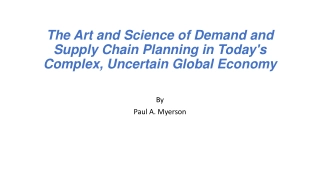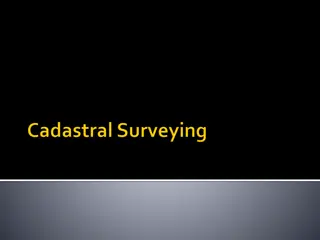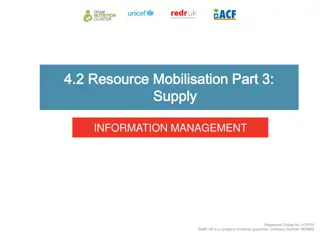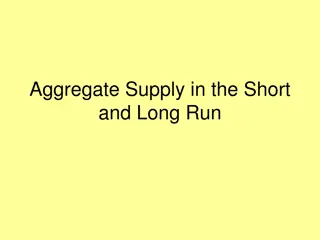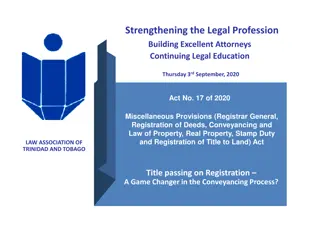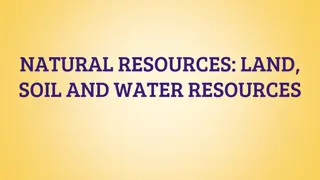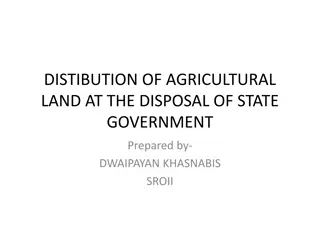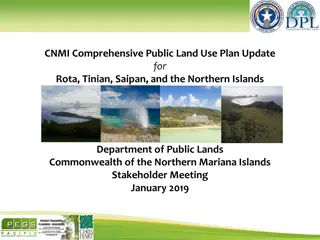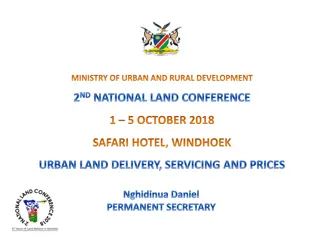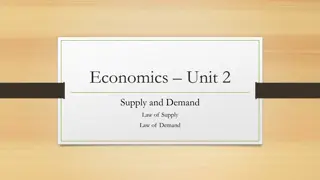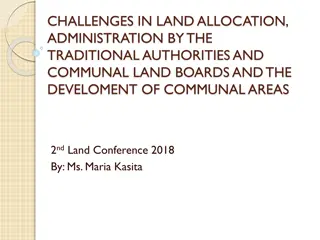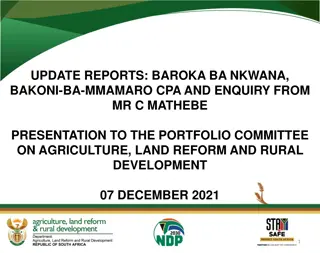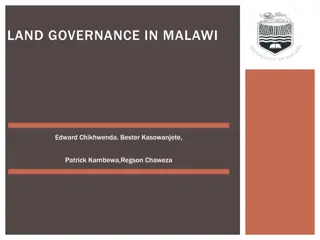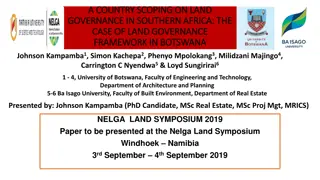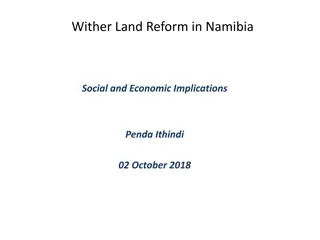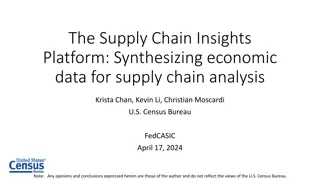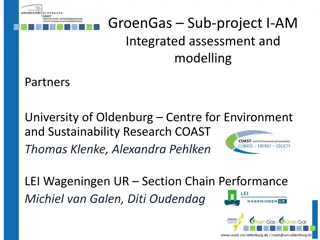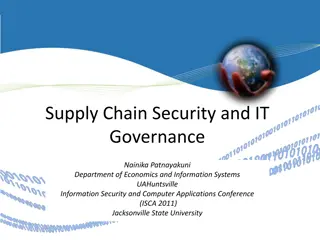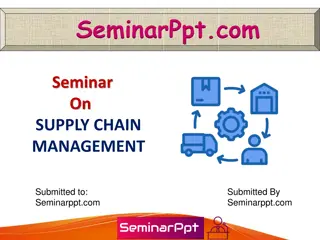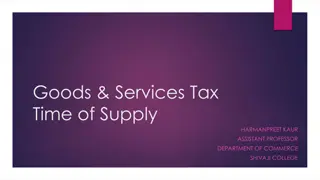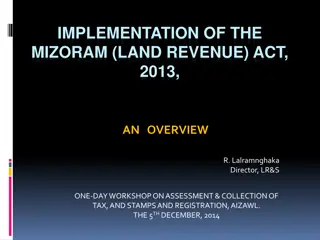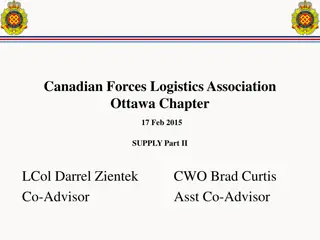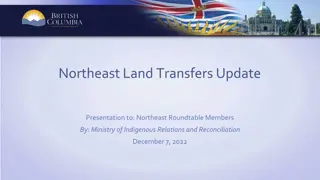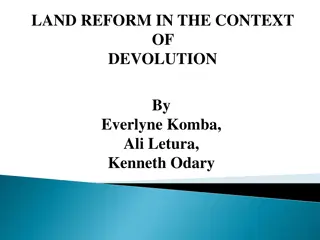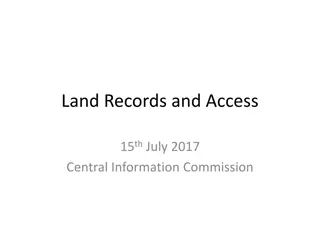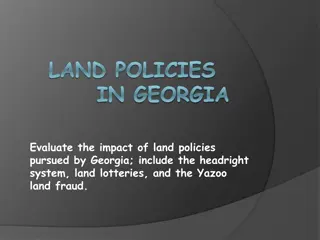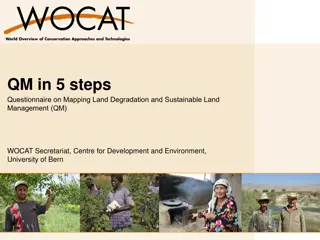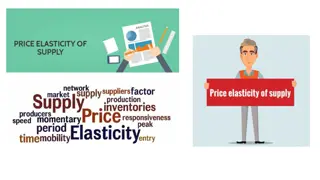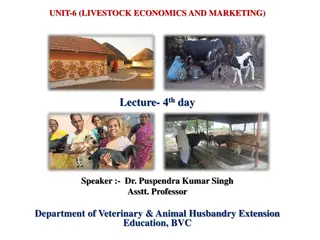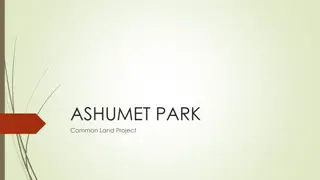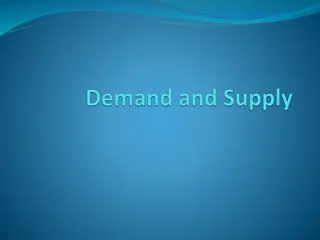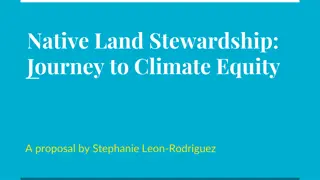The Art and Science of Demand and Supply Chain Planning: Navigating Today's Global Economy
Explore the intricacies of demand and supply chain planning in the modern global economy through the insightful content provided in this book. From achieving supply and demand balance to adapting to uncertainties like navigating white water rapids, the text delves into strategies for improving accur
2 views • 201 slides
INVENTORY MANAGEMENT.
Managing inventory under ISO 15189 guidelines involves Quantity, Quality, and Process management. Key aspects include demand forecasting, inventory movement control, consumption planning, and ensuring fitness for purpose. Quantity management aims to balance demand and supply, manage supply economics
5 views • 13 slides
Understanding Cadastral Systems in Land Management
Cadastral systems play a crucial role in land management by handling land registration, property taxation, and land tenure. These systems involve private conveyancing, registration of deeds, cadastral surveying, and mapping to maintain records efficiently. They provide information on parcel index ma
1 views • 16 slides
Responsibilities and Collaboration in Supply Management for Emergency Response
The role of various stakeholders in supply management for emergency response is crucial. The Nutrition Cluster Coordinator (NCC) coordinates with partners to identify and address supply needs, while Information Management Officer (IMO) supports in calculating caseloads and consolidating supply reque
1 views • 24 slides
Understanding Aggregate Supply in the Short and Long Run
Aggregate Supply in the short and long run is crucial in understanding the relationship between the economy's price level and the total quantity of goods and services produced. In the short run, sticky wages and production costs play key roles in determining supply levels, while in the long run, cha
0 views • 16 slides
Evolution of Land Law Systems in Trinidad and Tobago
Trinidad and Tobago's land law systems consist of the Common Law System and the Registered Land System. The Common Law system governs unregistered land where title passes upon execution and delivery of the deed. In contrast, the Registered Land System confers ownership upon registration and offers c
0 views • 28 slides
Understanding Land, Soil, and Water Resources
Natural resources such as land, soil, and water are crucial for human activities. Land comprises the lithosphere and is utilized for various purposes based on land use patterns. The study of land use patterns is essential for economic planning, as the availability of land is limited, leading to conf
5 views • 25 slides
Principles of Agricultural Land Distribution by State Government
The article discusses the distribution of agricultural land at the disposal of the state government in line with the policy objectives outlined in the WBLR Act. It covers the types of agricultural lands available, principles of land distribution, and restrictions on land transfers. Priority is given
0 views • 14 slides
CNMI Public Land Use Plan Update Stakeholder Meeting 2019
The CNMI Comprehensive Public Land Use Plan Update details the key drivers for land selection, recommendations for future land uses on each island, and includes discussions on the project team, schedule of key milestone dates, and the purpose and scope of the plan outreach and participation. The sta
4 views • 29 slides
Challenges and Solutions in Urban Land Delivery and Pricing in Namibia
The Urban Land and Housing Sector in Namibia faces significant challenges such as a backlog in land delivery, high input costs, weak urban planning, and limited institutional capacity. These issues lead to slow supply rates and affordability problems for end users. Addressing these challenges requir
0 views • 20 slides
Understanding Supply and Demand in Economics
Explore the fundamental concepts of supply and demand in economics, including the laws that govern them. Learn about the characteristics of free markets, the factors that determine supply, and how prices influence the quantities supplied and demanded. Gain insights into the law of supply and law of
0 views • 21 slides
Challenges in Land Allocation and Administration by Traditional Authorities and Communal Land Boards
The Communal Land Reform Act of 2002 introduced Communal Land Boards to assist Traditional Authorities in land administration. However, challenges such as misconceptions of powers, limited technical capacity, inadequate resources, and unclear procedures have hindered smooth registration and resoluti
0 views • 15 slides
Update Reports: Baroka Ba Nkwana, Bakoni-Ba-Mmamaro CPA, and Enquiry from Mr. C. Mathebe Presentation to the Portfolio Committee on Agriculture, Land Reform, and Rural Development
This report provides updates to the Portfolio Committee on Agriculture, Land Reform, and Rural Development regarding Mr. Collen Mathebe's matter, Bakoni-Ba-Mmamaro CPA, and Baroka Ba Nkwana Land Claim. Mr. Mathebe's issue cannot be resolved through the Land Title Adjustment Act, and alternative opti
0 views • 38 slides
Land Governance in Malawi: Challenges and Progress
Malawi's land governance system has evolved significantly since the colonial era, with a framework that includes institutional and legal aspects. The country has faced challenges in managing land disputes, valuation, taxation, and public land use. The institutional setup involves the central governm
0 views • 23 slides
Land Governance Framework in Botswana: A Country Scoping Study
Botswana, a landlocked middle-income country in Southern Africa, faces challenges such as high population growth, unemployment, poverty, and a less skilled workforce. This study examines the land governance framework in Botswana, focusing on key challenges in land administration, dispute resolution,
0 views • 15 slides
Implications of Land Reform in Namibia: Social and Economic Insight
Land reform in Namibia is crucial for inclusive growth and shared prosperity, with access to land being a key factor. Productive land usage can lead to wealth creation and social development. The importance of agriculture in the economy is highlighted, along with the need for skilled farmers and a s
0 views • 7 slides
Enhancing Land Degradation Neutrality Targets in Lebanon's National Action Programme
Integrating LDN targets into Lebanon's National Action Programme, led by Dr. Chadi Mohanna, aims to align the NAP with the UNCCD's 10-Year Strategy, set national targets for Land Degradation Neutrality, and implement measures to combat land degradation aggravated by climate change. The project focus
0 views • 23 slides
Introduction to Supply Chain Management
Explore the key components of supply chains, the importance of supply chain management technology, and strategies to overcome challenges. Learn about supply chain visibility, the structure of supply chains, and the three segments - upstream, internal, and downstream. Discover how organizations acces
1 views • 29 slides
Enhancing Supply Chain Insights Through Holistic Data Synthesis
Synthesizing economic data for comprehensive supply chain analysis, this talk by Krista Chan, Kevin Li, and Christian Moscardi from the U.S. Census Bureau discusses the goals, challenges, supply chain interests, data sources, and desired functionalities to present a holistic view of product supply c
0 views • 16 slides
Integrated Assessment and Modelling for Sustainable Biogas Supply Chains
The GroenGas sub-project I-AM focuses on integrating and synthesizing results from various sub-projects to assess innovations and improvements in biogas supply chains. The project aims to implement powerful options for sustainable supply chain management, including performance analysis, benchmarking
0 views • 14 slides
Understanding Supply in Economics
Explore the definition of supply, changes in supply versus changes in quantity supplied, non-price determinants of supply, the supply curve, key outcomes to know, and real-world examples affecting gasoline supply. Develop a strong foundation in economic concepts with detailed explanations and graphi
0 views • 33 slides
Understanding Supply in Economics
Explore the concept of supply in economics, including its definition, determinants, and graphical representation. Learn about the law of supply, non-price factors affecting supply, and key terms such as market supply and horizontal summation. Understand the difference between a change in quantity su
0 views • 30 slides
Understanding Supply in Economics
Supply in economics refers to the quantity of goods that firms are willing to produce at different prices over a specific period. The Law of Supply states that as prices increase, the quantity supplied by firms also increases. Individual and market supply curves illustrate this relationship, with ot
0 views • 28 slides
Understanding Supply and Costs of Production in Economics
Supply in economics refers to the availability of goods and services in the market, influenced by factors like the law of supply, supply schedules, and supply elasticity. Cost of production involves considering marginal benefits and costs in determining output levels. These concepts are vital in und
0 views • 20 slides
Enhancing Supply Chain Security and IT Governance: An Overview
This presentation delves into the critical aspects of supply chain security and IT governance, highlighting the synchronization of IT decisions across supply chains, global supply chain concerns, the cost implications of supply chain security lapses, and the need for more research and strategic alig
0 views • 28 slides
Understanding Supply Chain Management: Key Concepts and Processes
Supply chain management (SCM) involves the centralized management of goods and services flow, covering processes from raw materials to final products. By efficiently managing the supply chain, companies can reduce costs and improve product delivery. This seminar presentation explores the definition,
0 views • 24 slides
Understanding Goods and Services Tax (GST) Time of Supply
Goods and Services Tax (GST) time of supply, also known as TOS, determines when GST becomes payable on a supply. This includes various elements like agreement to supply, delivery of goods, provision of services, invoice issuance, payment, and recording of payments. The time of supply for goods and s
0 views • 26 slides
Overview of the Mizoram Land Revenue Act, 2013
The Mizoram Land Revenue Act, 2013 replaced several previous regulations and came into effect on June 1, 2013. It establishes authorities for land management, outlines control and powers over land, and provides guidelines for land allotment for specific purposes. The Act designates the Government of
0 views • 18 slides
Canadian Forces Logistics Association Ottawa Chapter Update
The Canadian Forces Logistics Association Ottawa Chapter provided updates on supply chain management, officer courses, qualification updates, and riggers' career path. They discussed initiatives such as Supply Update Roadmap, Supply Relationships Geographic Map, Supply Officer and Supply Tech update
0 views • 11 slides
Update on Northeast Land Transfers: Presentation to Roundtable Members
Ministry of Indigenous Relations and Reconciliation provided an update on land transfers in Northeastern British Columbia, focusing on Treaty Land Entitlement, stakeholder engagement, and communication methods. The presentation highlighted the historical land debt, final settlement agreements, and t
0 views • 8 slides
Land Reform in the Context of Devolution in Kenya
Kenya, with a land area of 582,646 sq. Km, has undergone land reform in the context of devolution since gaining independence in 1963. The country's adoption of the Constitution in 2010 led to the establishment of a system with 1 national government and 47 devolved governments. Kajiado County, inhabi
0 views • 33 slides
China-Africa Supply Chain Cooperation: Challenges and Opportunities
China-Africa Supply Chain Cooperation presents both challenges and opportunities for development. The growth of China-Africa supply chain is crucial, considering Africa's participation in the global supply chain mainly focused on providing primary products. The strategic importance of this relations
0 views • 19 slides
Importance of Land Records in Preventing Land Disputes
Land records play a crucial role in documenting ownership, facilitating land-related transactions, and preventing costly litigation. They serve as a lifeline for effective governance and provide legal status to landowners, ensuring clarity and transparency in land ownership. Without proper land reco
0 views • 15 slides
Impact of Land Policies in Georgia: Headright System, Land Lotteries, and Yazoo Land Fraud
Georgia pursued various land policies post-Revolutionary War to allocate land obtained from Native Americans. The headright system granted land to soldiers and white men, aiming to boost population and state power. Land lotteries distributed land through random draws. The Yazoo land fraud scandal ta
0 views • 20 slides
5 Steps Questionnaire on Mapping Land Degradation and Sustainable Land Management
Preparation for mapping land degradation and sustainable land management involves steps such as preparing the base map, identifying contributing specialists, assessing land use systems, understanding land degradation types, and providing expert recommendations. The process includes analyzing area tr
0 views • 32 slides
Understanding Price Elasticity of Supply in Economics
Price elasticity of supply measures how much the quantity supplied responds to changes in price. It can be inelastic (quantity supplied responds slightly), elastic (quantity supplied responds substantially), or unit-elastic (price elasticity of supply equals 1). Various determinants like the passage
0 views • 16 slides
Understanding Livestock Economics: The Law of Supply Explained
Exploring the concept of supply in livestock economics, this lecture covers theories, individual supply schedules, market supply schedules, and the law of supply. Dr. Puspendra Kumar Singh delves into the relationship between commodity prices and producer supply, offering insights into market dynami
0 views • 30 slides
Ashumet Park Common Land Project Overview
The Ashumet Park Common Land Project aims to transform Lot 8 into a multi-use community area in Ashumet Valley. The project includes three phases: Land Survey, Land Clearing, and Grass Installation. Phase 1 involved conducting a land survey, while Phase 2 focused on land clearing by removing trees a
0 views • 7 slides
Understanding Demand and Supply in Economics
Demand and supply are core concepts in economics, driving the market economy. Demand reflects the desire for a product at different prices, with an inverse relationship between price and quantity demanded. Supply, on the other hand, represents what producers are willing to offer at various prices, w
0 views • 7 slides
Native Land Stewardship: Path to Climate Equity
Stephanie Leon-Rodriguez presents a proposal focused on promoting land back initiatives, including federal support programs like the Land Buy-Back Program for Tribal Nations and conservation easements. State support through initiatives like the Mass Conservation Land Tax Credit Program is also highl
0 views • 13 slides
